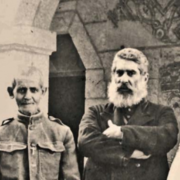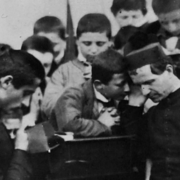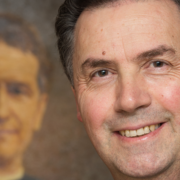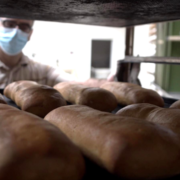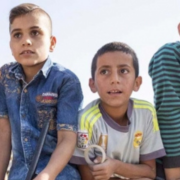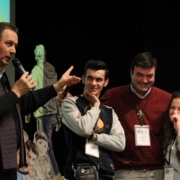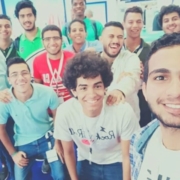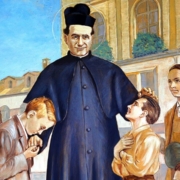My dear young people,
joy is a central element in the life of a Christian.
My heartfelt greetings to each one of you, on the five continents: to you, young people of the “Salesian world” and to all the young people who will receive this message through you.
In article 17 of the Constitutions of the Salesians of Don Bosco – with the heading “Optimism and joy” – we read: “Because he is a herald of the Good News, [the Salesian] is always cheerful. He radiates this joy and he is able to educate to a Christian and festive way of life”.
I am sure that this is a rule of life for us Salesians and for all the members of our Salesian Family: it is something beautiful, which belongs to our charismatic identity. How I wish it could be like that in your lives too, dear young people!
I want to speak to you about this profound joy, which comes from God and from being rooted in him. Definitely, our Christian vocation has also the mission of bringing joy to the world: that deep and authentic joy that lasts because it comes from God. I am convinced that you and many other young people like you are longing (and sometimes needing) to hear that the Christian message is one of joy and hope.
My dear young people, our hearts are made for joy and for living with hope. It is something we are born with, intimately engraved in the depths of the heart of every person; a joy that is authentic, not fleeting, but profound and full, which gives ‘flavour’ to our existence. “You, young people are the now of God”, as Pope Francis told you1. You are at a stage of your existence that is characterized by the discovery of life, of yourselves and of your relationships with others. You are looking to the future and you have dreams. Your desire for happiness, friendship and love is strong. You like to share, have ideals and draw up plans. All this is part of your youthful life. I am not saying that all young people live in this way. There are, unfortunately, young people who are very far from such youthful dreams, though they too have the right to nurture their dreams, and should not give up dreaming.
Life is accompanied by the gifts God our Father continually provides: the joy of being alive and healthy, the joy coming from the beauty of nature; the joy of friendship and genuine love, of a work well done, which costs effort, but which also gives great satisfaction. The joy of a good family atmosphere – even if not all of you experience that in your lives; the joy of feeling understood and of serving others.
It is beautiful to realize that we are part of this reality, dear young people, and to discover that all this is not the fruit of chance, but is what God desires for each one of us, for each one of you, because God is the source of true joy, this joy has its origin in Him. It is beautiful to discover in life that we are accepted, welcomed and loved by God. It is beautiful to feel in the depths of your heart that you are personally loved by God. It is touching for a young person to get to the point in which he can convincingly say to himself or herself this great truth: “God loves me, and he loves me unconditionally, in a unique and personal way”. And the great proof of this love is the encounter with his Son Jesus Christ: in him we find the joy we seek. The authentic and true encounter with Jesus always gives rise to great inner joy in everyone.
While I am writing this, I am thinking of you, dear young people belonging to other religions, who perhaps cannot perceive in your own experience what I am talking about in reference to Jesus, even if you understand my words. However, you can have this personal and intimate experience, whatever your religious affiliation: God loves you, and he loves you deeply, because it belongs to the essence of God to love immensely all that he has created. You are there in his love; I am there too, each one of us, each one of you, my dear young people.
God’s beloved young people, wherever you are in the world, whatever your religion, open your heart to God, discover that God is present in your life, that he is faithful and will never abandon you. We can always meet him in his Word: “When your words came, I devoured them: your word was my delight and the joy of my heart” (Jer 15:16). Listen to God’s voice and to his Word, and you will have many answers to what you carry in your heart and in your thoughts.
Like Don Bosco, father and teacher of the youth of the world, I would like to invite you, in his name, to have the courage never to stray far from God, to choose Him at every moment of your lives with generosity, not being satisfied with giving the bare minimum, but committing yourselves to give the best that each one has in his/her heart. Your life, dear young people, is precious, and whatever vocation God calls you to, it is a life worth living in self-giving, in service and in love for others.
As Pope Francis says: “Dear young people, you are priceless! You are not up for sale! Please, do not let yourselves be bought. Do not let yourselves be seduced. Do not let yourselves be enslaved by forms of ideological colonization that put ideas in your heads, with the result that you end up becoming slaves, addicts, failures in life. You are priceless. … Fall in love with this freedom, which is what Jesus offers”2. Let me also invite you to have the courage to live the Beatitudes that Jesus proposes to us in the Gospel. They are a beautiful way of living the Gospel, with diverse ‘faces’ and ways that lead to happiness in Christ.
Imitating Don Bosco, I want to propose to you, as I wrote in this year’s Strenna, to be enthusiastic, to live life as a celebration and faith as true happiness. This is what Don Bosco resolved for himself, and made it a reality with his boys at Valdocco. Today that Valdocco of festive living and joy can be any of the Salesian or non-Salesian places and houses where you are. I ask you to become and to be missionaries of joy, because you are disciples-missionaries of Jesus. Tell your friends and other young people that you have found this precious treasure, which is Jesus himself. Propagate the joy and hope born of faith, reaching out to others with these gifts. Be missionaries for other young people, as Don Bosco proposed to his boys at Valdocco, bringing to those who are not well, to those who suffer, to the poorest, to those who “have no opportunities”, the joy that Jesus wants to offer everyone. Bring this same joy to your families, to your schools or universities; talk about it in your workplaces and among your friends. You will see that if that joy in your heart comes from God, it will become truly contagious, wonderfully contagious because it is life-giving.
Don’t you think that, after what I have just said, it becomes easier to understand what Dominic Savio used to say at Valdocco: “We make holiness consist in being always cheerful”?
May Mary, Mother and Help of Christians, accompany all of us on this journey. She welcomed the Lord within herself and became his herald with a song of praise and joy: “My soul proclaims the greatness of the Lord and my spirit rejoices in God my Saviour” (Lk 1:46-47).
What is the joy that resonates in your hearts today, my dear young people?
May you be happy now and forever in heaven, as Don Bosco used to say!
I bless you and greet you with true and deep affection,
Ángel Fernández Artime
Rector Major




